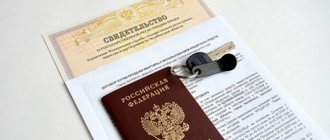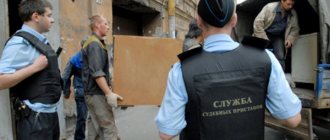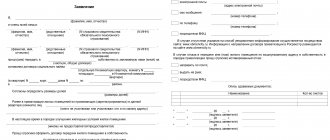Article updated: December 20, 2021
Mitrofanova SvetlanaLawyer. Work experience - 15 years
Hello. Here I will analyze the nuances of privatization with the participation of minor children, when they may not be included in it, etc. I will definitely indicate articles of legislation that confirm my words.
A small digression - if you need a free consultation, write online to the lawyer on the right or call (24 hours a day, 7 days a week): 8 (499) 938-45-78 (Moscow and region); (St. Petersburg and region); (all regions of the Russian Federation).
Can minor children participate in privatization?
The Federal Law of July 4, 1991 “On Privatization” clearly states that if minors are registered and permanently reside in a municipal apartment, then their participation in the procedure for turning over ownership of housing on preferential terms is mandatory. Under no circumstances can a child be deprived of his share in the purchased apartment.
Therefore, if for some reason you do not want to participate in the privatization of the child, then he must be evicted from the home. This can only be done in court; you can read more about this in this article.
Grounds for the participation of minors in privatization:
- actual residence in the apartment;
- registration (registration) in residential premises.
If these two conditions are met, then the child has the right to a share equal to the shares of the other participants in the privatization. It is impossible to reduce it or completely deprive a minor of a part of the apartment.
Normative base
Privatization is regulated by Law No. 1541-1, which was developed and published back in 1991. This document regulates all the fundamental principles that make it possible to transfer state and municipal real estate into the ownership of citizens. After the procedure, the person privatizing the property is given a full list of rights to dispose of it. Living space can be sold, exchanged, rented, donated, bequeathed, or pledged. In addition to the main legislative act in this area, one should rely on the norms of the Housing Code of the Russian Federation.
Over the years, the law on privatization has undergone changes, but the basic principles of the procedure have remained unchanged:
- All citizens can participate in the procedure, but only once in their life.
- Re-registration of property is free of charge.
Persons who legally reside in social real estate can become participants in the program. Confirmation of this fact is a social rent agreement or a move-in order, if it has not been replaced by an agreement.
Is it possible to privatize an apartment for a minor child?
None of the current regulatory legal acts of Russia prohibits a minor from owning real estate. However, he will be able to make any transactions with her only after 18 years of age. Legal representatives, of course, can try to sell or donate this apartment. But this requires permission from the guardianship authorities, and they are very reluctant to give it, because it infringes on the rights of the child.
There are three options when the entire apartment can be privatized for a minor:
- All other persons registered in the apartment refused privatization in favor of the child.
- Those living in the apartment have already used their right to privatization.
- The child is the only person registered in the apartment. For example, if the social housing tenant dies.
Privatization will actually take place in the same order as usual. We described it in this article.
Example. Orlov G.V. was a tenant in a council apartment. In 2008, he married S.L. Guryeva, who already had a three-year-old son from her first marriage. Orlov registered both his wife and her son in his apartment, since Guryeva was registered in her own home in another city. In 2012, the couple decided to divorce, and the woman and her son left Orlov’s apartment for their own city. However, they were in no hurry to check out of the apartment, and Orlov did not insist. In 2015, the man decided to privatize his living space. He asked his ex-wife to deregister himself and his son, but she refused. She explained that she also wants to participate in privatization, and also turn part of the apartment into her son’s favor.
Orlov was forced to go to court with a claim to recognize his ex-wife and her child as having lost the right to use the apartment. He motivated this by his long absence from the registration address, as well as by the fact that the defendants are not members of his family and they own other housing. The court fully satisfied the plaintiff's demands and Guryev and his son were discharged. After this, Orlov went through the privatization procedure and received the apartment as sole ownership.
Arbitrage practice
In 2021, judicial practice in relation to the privatization of residential real estate was supplemented with another trial. The plaintiff filed a claim against the local administration demanding the privatization of real estate. At the same time, the representative of the minor child filed a counterclaim to allocate the child ½ share in the apartment, on the basis that he lives there and is registered.
Having considered the case, the court found that the plaintiff was unable to carry out privatization pre-trial, since the building in which her apartment is located is not currently municipal. Previously, this facility belonged to a state farm, which became bankrupt and was liquidated as a legal entity. After its liquidation, the official real estate was not transferred to the balance of the local administration, which does not allow them to approve privatization. At the court hearing, it was decided to partially satisfy the plaintiff’s demands, that is, to allow her to privatize half of this premises. The second half, according to the claim of the minor’s representative, will be privatized in his name, since it is unlawful to exclude him from the list of participants; moreover, such a step allows the procedure to be recognized as unfounded and canceled.
As a result of the court hearing, both claims were satisfied, and the plaintiff and the minor child received equal shares in the privatized property.
Decision of November 20, 2021 in case No. 2-1655/2017
- Look
Rules
Despite the fact that the privatization procedure with the participation of children is practically no different from the standard one, there are still certain rules. Let's look into them.
There are three main categories of persons under eighteen years of age:
- Up to 14 years old . In fact, these citizens do not have the right to independently make any transactions. Legal representatives (parents, guardians) must act on their behalf.
- From 14 to 18 years old . The legislator allows teenagers to make some transactions on their own, and some only with the consent of their parents. In relation to privatization, applications are drawn up and signed by such children in their own hands, but certification of documents by their legal representatives is required.
- Emancipated. This concept means that children between the ages of 16 and 18 have all the legal rights of adults. This can be achieved either with the consent of the parents or by a court decision. In this case, minors can submit an application on their own, but the package of documents will have to be accompanied by a decision on emancipation.
Expert opinion
Noskov Georgy
Lawyer. Experience 12 years. Specialization: civil, family, inheritance law.
The next point that you should pay attention to is that the child has the right to privatize only the apartment in which he is registered. For example, if his parents divorced, then the child may be registered with his father, but actually live with his mother at a different address. In this case, he will participate in the privatization of the father’s apartment if he does not evict the child in court.
Under 18 years of age, a minor can only exercise the right to preferential treatment of home ownership once. Even if he changed his place of residence and the new apartment is privatized again.
Underwater rocks
When buying a home with minor children, you first need to check whether the seller of the home is the owner. It is required to verify the authenticity of the submitted documents.
It is necessary to clarify with the property owner whether there are minor children, since infringement of their rights may have a negative impact on the transaction.
Children have the right to challenge the illegality of the transaction in court within 10 years. Sometimes parents sign their children out to privatize an apartment.
When selling a privatized apartment with children, parents will have to provide the guardianship authority with evidence that the living conditions in the new apartment will be significantly better. The area of the apartment being purchased must be at the same level or larger, otherwise the transaction may not take place. Sometimes the administration authorities agree to a meeting, but only if it justifies the expectation.
Children's rights
The rights of minors are an object specially protected by state law. That is why the closest attention is paid to privatization if children are involved. So, if the child’s rights are somehow violated or he did not participate in privatization at all, then such a transaction is considered void and the contract is canceled.
To do this, it is necessary for any interested person to apply to the court (the child himself, the legal representative, guardianship authorities, the prosecutor’s office, etc.). The statute of limitations for such claims is quite long – 10 years. Moreover, it is calculated neither from the moment of concluding the privatization agreement nor from the time when the violation became known.
Another right of children participating in privatization is the opportunity to take ownership of a second municipal apartment after reaching 18 years of age. That is, they can undergo the preferential procedure twice, although for all other citizens this procedure is one-time. This right remains even if an emancipated child participated.
Rules for registering housing without a younger family member
Sometimes parents, in order to avoid paperwork, want to carry out the real estate privatization procedure without the participation of their own child. However, instead of easing their lot, citizens find themselves an extra reason to appeal to all sorts of authorities.
If you simply sign the baby out of one room and reassign him to another, in essence, this will not change anything. For privatization, an archival certificate in Form 9 is required, which will reflect the essence of what is happening with real estate over the past 10 years . So, the child will “hang” in it, and the parents will have to take steps to return the registration to normal.
Attention! You can privatize real estate without a child only with the permission of the guardianship and trusteeship authorities. To do this, the government agency must make sure that the rights of the minor are not violated.
This is only possible under the following conditions.
- If you or your close relatives have an apartment on the right of ownership and they agree on general terms to allocate your child a share, at the same time, no less than what the child would have had during privatization.
- The other parent has another non-privatized apartment where the child is registered and he will participate in the privatization procedure there.
How to privatize an apartment with children
Privatization of apartments with minors registered in them is quite common. However, many still have questions about how to do this. Let us consider in more detail all aspects of preferential treatment of ownership of municipal housing with the participation of children.
Order and procedure
In order to privatize an apartment with the participation of a child, you must follow the following algorithm of actions.
| No. | Procedure | Comments |
| 1 | Collection of necessary documents | At the same time, a certificate of non-participation in privatization must also be requested for a minor |
| 2 | Drawing up an application for privatization | It is submitted either directly to the municipal authority in whose jurisdiction the apartment is located, or to the nearest branch of the MFC. Children over 14 years of age must be present when submitting the application. The participation of their legal representatives is also necessary, even if they themselves are not participants in the privatization. |
| 3 | Conclusion of a privatization agreement | At this stage, the appearance of minors after 14 years of age is mandatory - they independently seal the contract with their signature, which will be certified by a legal representative. |
| 4 | Registration of the transaction in Rosreestr | You can contact either the regional branch of this accounting organization or use the services of the MFC again. A minor in this institution will be issued a certificate of registration of ownership of part of the residential premises and from that moment he becomes the full owner. |
Statement
The application form for privatization with the participation of a minor, as well as the rules for filling it out, are practically no different from those without the participation of children.
So in the application you must indicate:
- name of the authority to which the application is submitted;
- document's name;
- description of the residential property (location, footage, etc.);
- data of all future owners;
- data of legal representatives of minors;
- date of compilation and signatures of all participants.
applications for privatization involving minors
Required documents
Along with the application, minors must provide:
- birth certificate or passport of the child;
- passport of the legal representative;
- a document confirming the right to represent the interests of the child (custody order, court decision, etc.);
- certificate of non-participation in privatization;
- apartment card;
- death certificates of the deceased previously registered in the apartment;
- technical documentation for housing.
The same documents will be needed when registering a transaction in Rosreestr, but you will need to attach another one - a receipt for payment of the state duty.
Expenses
The preferential privatization procedure is free, but you will have to incur some expenses. Insignificant, but still money, will be spent on making copies of documents submitted to the municipality and Rosreestr.
The largest expense item is payment of state fees. In 2021 it is 2000 rubles.
Deadlines
The privatization procedure will take no less than 45-50 days:
- from 1 to 10 days collecting documents (receiving an apartment card - up to three days, certificate of non-participation in privatization - up to 10);
- The legality and validity of the privatization application is considered for 30 days;
- 14 days are given to Rosreestr employees to enter data about the transaction into the general database and issue a certificate.
Registration procedure
The transfer of an apartment from municipal ownership to private hands follows one scheme. It doesn’t matter whether the procedure takes place with or without children. Having collected the necessary documents and attached signed statements to them, the participants in the process contact the local municipal department for housing issues.
Here an agreement will be drawn up, signed by all participants, including teenagers. This may take about a month.
With the contract in hand and documents for the apartment, new homeowners must register with Rosreestr. After receiving a certificate confirming ownership rights, the privatization procedure is considered completed.
How to privatize an apartment for a child
A child cannot voluntarily refuse privatization, but registered adults can do this. If they all refuse in favor of the minor, then he will become the sole owner.
However, those who refuse will have the right to live in the apartment for life. That is why many parents want to register an apartment only for their child.
An orphan child can also become the sole owner. In this case, his interests will be represented by the guardianship authorities.
Procedure and procedure
In fact, the procedure for turning public housing into the sole property of a child does not differ from a similar procedure in which a minor receives only part of the apartment. However, there is one peculiarity.
When collecting documents, all those refusing privatization must voluntarily appear before a notary and, in his presence, formalize the refusal.
There is also a less expensive way - to deregister the apartment. It is not necessary to have another place to live; an adult can simply check out to nowhere. We talked about how to do this here.
If the child is an orphan and no one else is registered in the apartment, then the procedure follows the standard algorithm.
Statement
The application must be supplemented with information about persons who refused the preferential right to receive an apartment.
Required documents
Notarized refusals of persons registered in the apartment must be attached to the usual package of documents. Otherwise, the list of required certificates does not change.
Expenses
Children, if they alone participate in privatization, do not have benefits in paying state fees. Their legal representatives will have to pay 2,000 rubles. The only exceptions are children left without parental care - the state covers their expenses for paying the tax fee when they take ownership of their home.
But it is impossible to say exactly the amount that will have to be spent on notary services to certify the refusal. It depends on the region, and on the rates of the notary’s office and on the number of people refusing.
Deadlines
The deadlines will also not be less than 45 days. Registration of a notarial refusal usually does not require much time - a maximum of one and a half to two hours.
Deadlines
The timing of privatization depends on the speed of collecting documents. Typically, various certificates take up to 15 days, and the review period in the housing department is up to two months.
The process itself can take up to 9 months, in a particular case the period varies.
Read about the advantages of apartment privatization. Is simplified privatization of a country house possible? Information here.
How long does privatization take? Details in this article.
Reasons for refusals
Refusal to privatize in which children participate is a fairly rare occurrence and is usually associated with the following reasons:
- not including a child in privatization participants;
- lack of grounds for the child to privatize the apartment (court decision to deregister him, lack of registration, was already a participant in privatization, etc.);
- not a complete package of documents has been submitted;
- errors in the application.
If you believe that the refusal is not legal and not justified, then the only authority that can resolve the dispute is the court. Both privatization participants and their legal representatives can file a claim.







